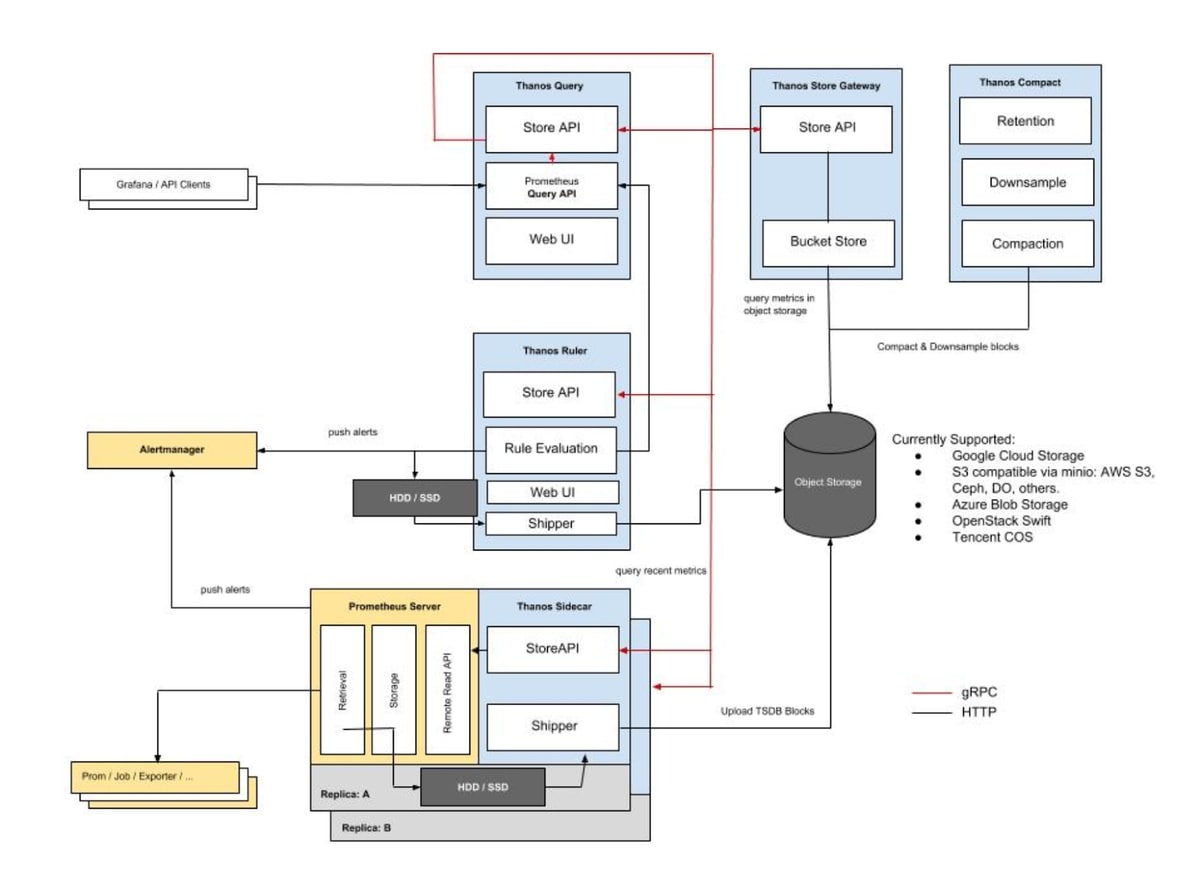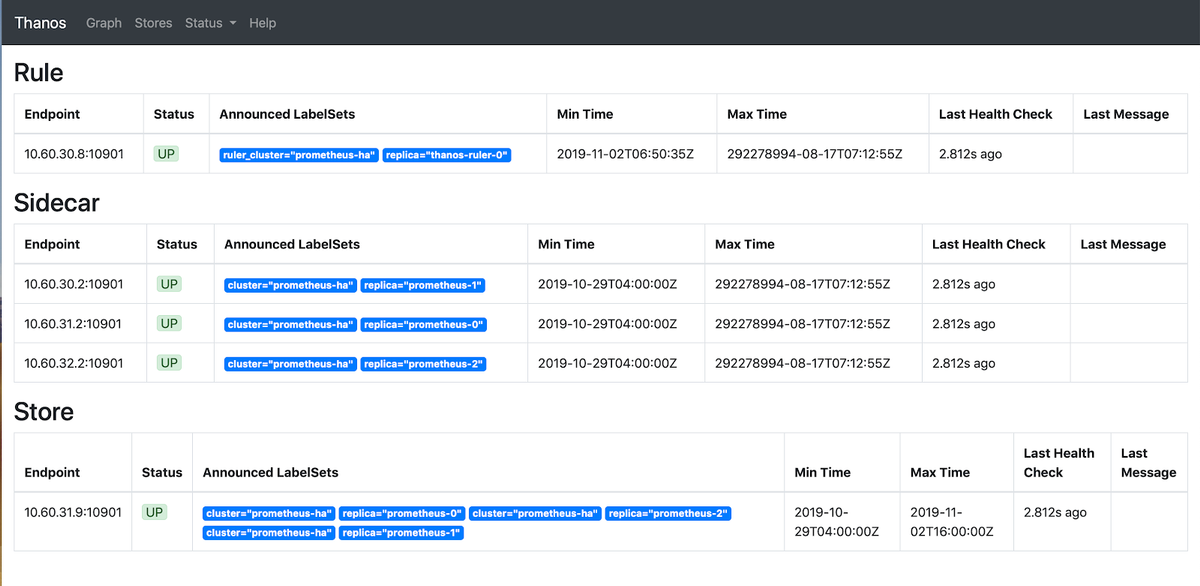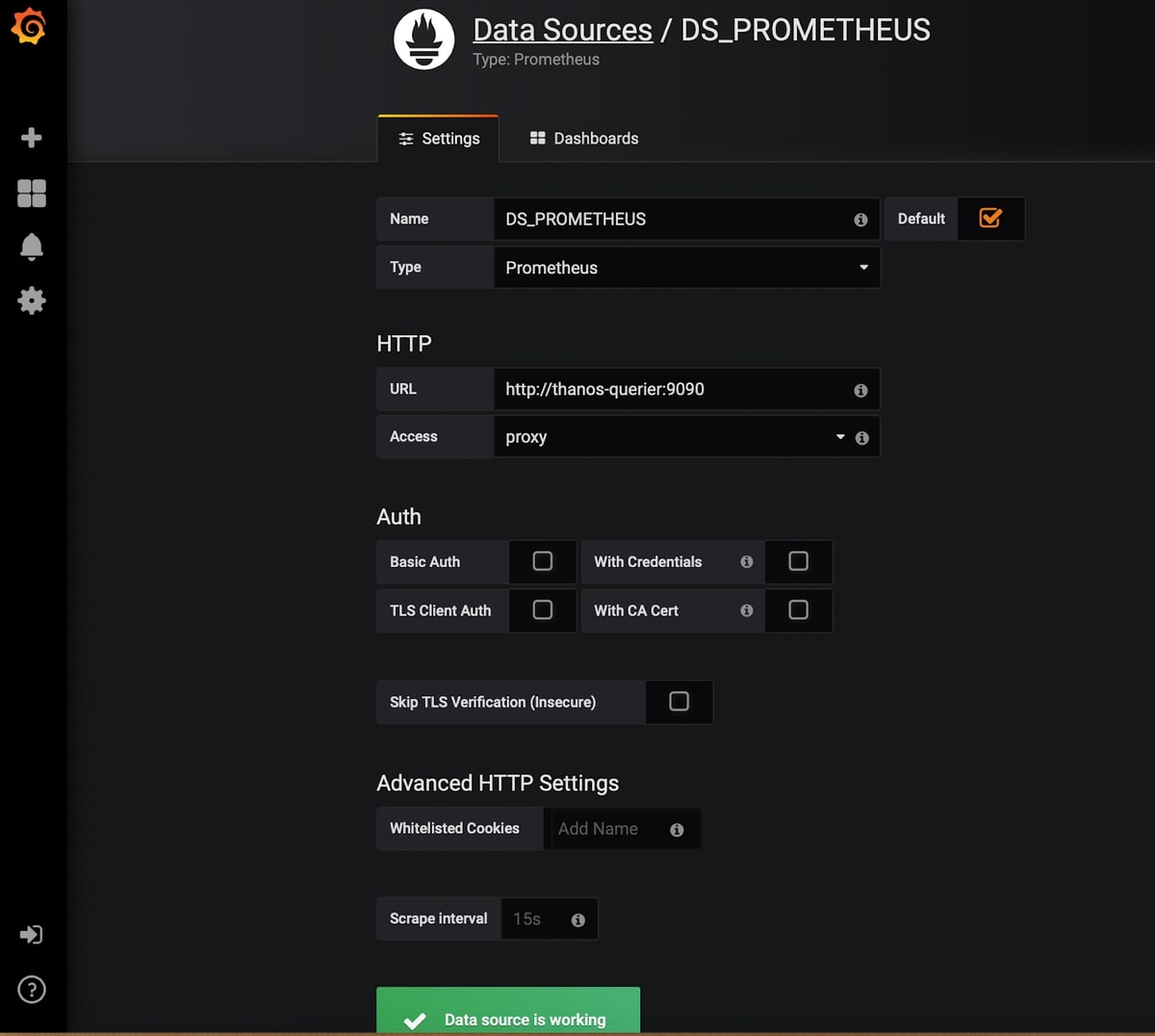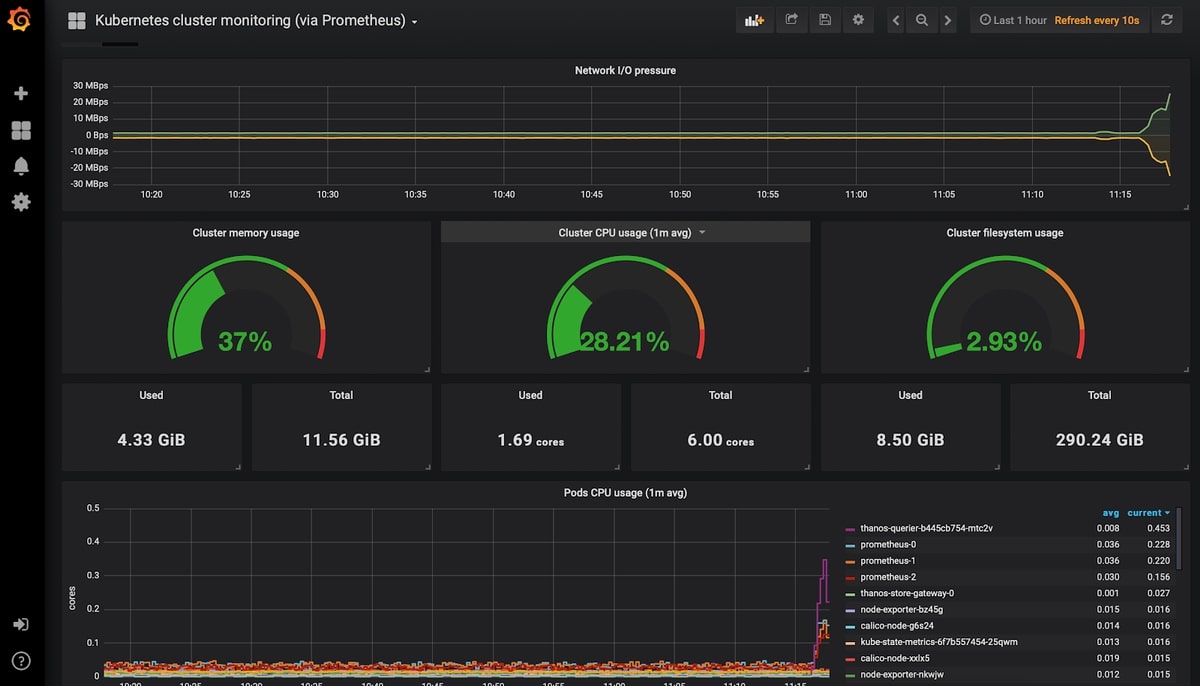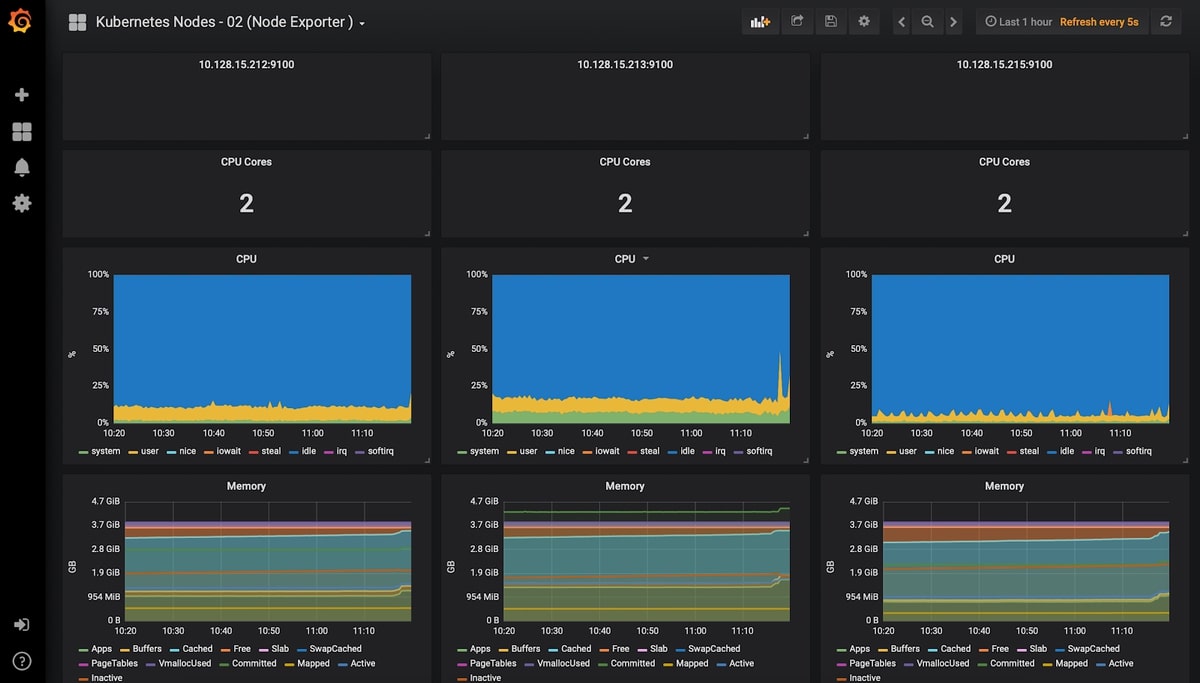Table of Contents
Introduction
In this article, we will deploy a clustered Prometheus setup that integrates Thanos. It is resilient against node failures and ensures appropriate data archiving. The setup is also scalable. It can span multiple Kubernetes clusters under the same monitoring umbrella. Finally, we will visualize and monitor all our data in accessible and beautiful Grafana dashboards.
Why Integrate Prometheus with Thanos?
Prometheus is scaled using a federated set-up, and its deployments use a persistent volume for the pod. However, not all data can be aggregated using federated mechanisms. Often, you need a different tool to manage Prometheus configurations. To address these issues, we will use Thanos. Thanos allows you to create multiple instances of Prometheus, deduplicate data, and archive data in long-term storage like GCS or S3.
Thanos Overview
Thanos Architecture
The components of Thanos are sidecar, store, query, compact, and ruler. Let's take a look at what each one does.
Thanos Sidecar
- The main component that runs along Prometheus
- Reads and archives data on the object store
- Manages Prometheus’s configuration and lifecycle
- Injects external labels into the Prometheus configuration to distinguish each Prometheus instance
- Can run queries on Prometheus servers’ PromQL interfaces
- Listens in on Thanos gRPC protocol and translates queries between gRPC and REST
Thanos Store
- Implements the Store API on top of historical data in an object storage bucket
- Acts primarily as an API gateway and therefore does not need significant amounts of local disk space
- Joins a Thanos cluster on startup and advertises the data it can access
- Keeps a small amount of information about all remote blocks on a local disk in sync with the bucket
- This data is generally safe to delete across restarts at the cost of increased startup times
Thanos Query
- Listens in on HTTP and translates queries to Thanos gRPC format
- Aggregates the query result from different sources, and can read data from Sidecar and Store
- In HA setup, Thanos Query even deduplicates the result
A note on run-time duplication of HA groups: Prometheus is stateful and does not allow for replication of its database. Therefore, it is not easy to increase high availability by running multiple Prometheus replicas.
Simple load balancing will also not work -- say your app crashes. The replica might be up, but querying it will result in a small time gap for the period during which it was down. This isn’t fixed by having a second replica because it could be down at any moment, for example, during a rolling restart. These instances show how load balancing can fail.
Thanos Query pulls the data from both replicas and deduplicates those signals, filling the gaps, if any, to the Querier consumer.
Thanos Compact
- Applies the compaction procedure of the Prometheus 2.0 storage engine to block data in object storage
- Generally not concurrent with safe semantics and must be deployed as a singleton against a bucket
- Responsible for downsampling data: 5 minute downsampling after 40 hours and 1 hour downsampling after 10 days
Thanos Ruler
Thanos Ruler basically does the same thing as the querier but for Prometheus’ rules. The only difference is that it can communicate with Thanos components.
Thanos Implementation
Prerequisites: In order to completely understand this tutorial, the following are needed:
1. Working knowledge of Kubernetes and kubectl
2. A running Kubernetes cluster with at least 3 nodes (We will use a GKE)
3. Implementing Ingress Controller and Ingress objects (We will use Nginx Ingress Controller); although this is not mandatory, it is highly recommended in order to reduce external endpoints.
4. Creating credentials to be used by Thanos components to access object store (in this case, GCS bucket)
a. Create 2 GCS buckets and name them as prometheus-long-term and thanos-ruler
b. Create a service account with the role as Storage Object Admin
c. Download the key file as json credentials and name it thanos-gcs-credentials.json
d. Create a Kubernetes secret using the credentials, as you can see in the following snippet:
kubectl create secret generic thanos-gcs-credentials --from-file=thanos-gcs-credentials.json -n monitoring
Deployment
Deploying Prometheus Services Accounts, Clusterrole and Clusterrolebinding: The following manifest creates the monitoring namespace, service accounts, clusterrole and clusterrolebindings needed by Prometheus.
apiVersion: v1
kind: Namespace
metadata:
name: monitoring
---
apiVersion: v1
kind: ServiceAccount
metadata:
name: monitoring
namespace: monitoring
---
apiVersion: rbac.authorization.k8s.io/v1beta1
kind: ClusterRole
metadata:
name: monitoring
namespace: monitoring
rules:
- apiGroups: [""]
resources:
- nodes
- nodes/proxy
- services
- endpoints
- pods
verbs: ["get", "list", "watch"]
- apiGroups: [""]
resources:
- configmaps
verbs: ["get"]
- nonResourceURLs: ["/metrics"]
verbs: ["get"]
---
apiVersion: rbac.authorization.k8s.io/v1beta1
kind: ClusterRoleBinding
metadata:
name: monitoring
subjects:
- kind: ServiceAccount
name: monitoring
namespace: monitoring
roleRef:
kind: ClusterRole
name: monitoring
apiGroup: rbac.authorization.k8s.io
---
Deploying Prometheus Configuration configmap: The following config map creates the Prometheus configuration file template that will be read by the Thanos sidecar component. The template will also generate the actual configuration file. The file will be consumed by the Prometheus container running in the same pod. It is extremely important to add the external_labels section in the config file so that the querier can deduplicate data based on it.
apiVersion: v1
kind: ConfigMap
metadata:
name: prometheus-server-conf
labels:
name: prometheus-server-conf
namespace: monitoring
data:
prometheus.yaml.tmpl: |-
global:
scrape_interval: 5s
evaluation_interval: 5s
external_labels:
cluster: prometheus-ha
# Each Prometheus has to have unique labels.
replica: $(POD_NAME)
rule_files:
- /etc/prometheus/rules/*rules.yaml
alerting:
# We want our alerts to be deduplicated
# from different replicas.
alert_relabel_configs:
- regex: replica
action: labeldrop
alertmanagers:
- scheme: http
path_prefix: /
static_configs:
- targets: ['alertmanager:9093']
scrape_configs:
- job_name: kubernetes-nodes-cadvisor
scrape_interval: 10s
scrape_timeout: 10s
scheme: https
tls_config:
ca_file: /var/run/secrets/kubernetes.io/serviceaccount/ca.crt
bearer_token_file: /var/run/secrets/kubernetes.io/serviceaccount/token
kubernetes_sd_configs:
- role: node
relabel_configs:
- action: labelmap
regex: __meta_kubernetes_node_label_(.+)
# Only for Kubernetes ^1.7.3.
# See: https://github.com/prometheus/prometheus/issues/2916
- target_label: __address__
replacement: kubernetes.default.svc:443
- source_labels: [__meta_kubernetes_node_name]
regex: (.+)
target_label: __metrics_path__
replacement: /api/v1/nodes/${1}/proxy/metrics/cadvisor
metric_relabel_configs:
- action: replace
source_labels: [id]
regex: '^/machine\.slice/machine-rkt\\x2d([^\\]+)\\.+/([^/]+)\.service$'
target_label: rkt_container_name
replacement: '${2}-${1}'
- action: replace
source_labels: [id]
regex: '^/system\.slice/(.+)\.service$'
target_label: systemd_service_name
replacement: '${1}'
- job_name: 'kubernetes-pods'
kubernetes_sd_configs:
- role: pod
relabel_configs:
- action: labelmap
regex: __meta_kubernetes_pod_label_(.+)
- source_labels: [__meta_kubernetes_namespace]
action: replace
target_label: kubernetes_namespace
- source_labels: [__meta_kubernetes_pod_name]
action: replace
target_label: kubernetes_pod_name
- source_labels: [__meta_kubernetes_pod_annotation_prometheus_io_scrape]
action: keep
regex: true
- source_labels: [__meta_kubernetes_pod_annotation_prometheus_io_scheme]
action: replace
target_label: __scheme__
regex: (https?)
- source_labels: [__meta_kubernetes_pod_annotation_prometheus_io_path]
action: replace
target_label: __metrics_path__
regex: (.+)
- source_labels: [__address__, __meta_kubernetes_pod_prometheus_io_port]
action: replace
target_label: __address__
regex: ([^:]+)(?::\d+)?;(\d+)
replacement: $1:$2
- job_name: 'kubernetes-apiservers'
kubernetes_sd_configs:
- role: endpoints
scheme: https
tls_config:
ca_file: /var/run/secrets/kubernetes.io/serviceaccount/ca.crt
bearer_token_file: /var/run/secrets/kubernetes.io/serviceaccount/token
relabel_configs:
- source_labels: [__meta_kubernetes_namespace, __meta_kubernetes_service_name, __meta_kubernetes_endpoint_port_name]
action: keep
regex: default;kubernetes;https
- job_name: 'kubernetes-service-endpoints'
kubernetes_sd_configs:
- role: endpoints
relabel_configs:
- action: labelmap
regex: __meta_kubernetes_service_label_(.+)
- source_labels: [__meta_kubernetes_namespace]
action: replace
target_label: kubernetes_namespace
- source_labels: [__meta_kubernetes_service_name]
action: replace
target_label: kubernetes_name
- source_labels: [__meta_kubernetes_service_annotation_prometheus_io_scrape]
action: keep
regex: true
- source_labels: [__meta_kubernetes_service_annotation_prometheus_io_scheme]
action: replace
target_label: __scheme__
regex: (https?)
- source_labels: [__meta_kubernetes_service_annotation_prometheus_io_path]
action: replace
target_label: __metrics_path__
regex: (.+)
- source_labels: [__address__, __meta_kubernetes_service_annotation_prometheus_io_port]
action: replace
target_label: __address__
regex: (.+)(?::\d+);(\d+)
replacement: $1:$2
Deploying Prometheus Rules configmap: this will create alert rules that will be relayed to Alertmanager for delivery.
apiVersion: v1
kind: ConfigMap
metadata:
name: prometheus-rules
labels:
name: prometheus-rules
namespace: monitoring
data:
alert-rules.yaml: |-
groups:
- name: Deployment
rules:
- alert: Deployment at 0 Replicas
annotations:
summary: Deployment {{$labels.deployment}} in {{$labels.namespace}} is currently having no pods running
expr: |
sum(kube_deployment_status_replicas{pod_template_hash=""}) by (deployment,namespace) < 1
for: 1m
labels:
team: devops
- alert: HPA Scaling Limited
annotations:
summary: HPA named {{$labels.hpa}} in {{$labels.namespace}} namespace has reached scaling limited state
expr: |
(sum(kube_hpa_status_condition{condition="ScalingLimited",status="true"}) by (hpa,namespace)) == 1
for: 1m
labels:
team: devops
- alert: HPA at MaxCapacity
annotations:
summary: HPA named {{$labels.hpa}} in {{$labels.namespace}} namespace is running at Max Capacity
expr: |
((sum(kube_hpa_spec_max_replicas) by (hpa,namespace)) - (sum(kube_hpa_status_current_replicas) by (hpa,namespace))) == 0
for: 1m
labels:
team: devops
- name: Pods
rules:
- alert: Container restarted
annotations:
summary: Container named {{$labels.container}} in {{$labels.pod}} in {{$labels.namespace}} was restarted
expr: |
sum(increase(kube_pod_container_status_restarts_total{namespace!="kube-system",pod_template_hash=""}[1m])) by (pod,namespace,container) > 0
for: 0m
labels:
team: dev
- alert: High Memory Usage of Container
annotations:
summary: Container named {{$labels.container}} in {{$labels.pod}} in {{$labels.namespace}} is using more than 75% of Memory Limit
expr: |
((( sum(container_memory_usage_bytes{image!="",container_name!="POD", namespace!="kube-system"}) by (namespace,container_name,pod_name) / sum(container_spec_memory_limit_bytes{image!="",container_name!="POD",namespace!="kube-system"}) by (namespace,container_name,pod_name) ) * 100 ) < +Inf ) > 75
for: 5m
labels:
team: dev
- alert: High CPU Usage of Container
annotations:
summary: Container named {{$labels.container}} in {{$labels.pod}} in {{$labels.namespace}} is using more than 75% of CPU Limit
expr: |
((sum(irate(container_cpu_usage_seconds_total{image!="",container_name!="POD", namespace!="kube-system"}[30s])) by (namespace,container_name,pod_name) / sum(container_spec_cpu_quota{image!="",container_name!="POD", namespace!="kube-system"} / container_spec_cpu_period{image!="",container_name!="POD", namespace!="kube-system"}) by (namespace,container_name,pod_name) ) * 100) > 75
for: 5m
labels:
team: dev
- name: Nodes
rules:
- alert: High Node Memory Usage
annotations:
summary: Node {{$labels.kubernetes_io_hostname}} has more than 80% memory used. Plan Capcity
expr: |
(sum (container_memory_working_set_bytes{id="/",container_name!="POD"}) by (kubernetes_io_hostname) / sum (machine_memory_bytes{}) by (kubernetes_io_hostname) * 100) > 80
for: 5m
labels:
team: devops
- alert: High Node CPU Usage
annotations:
summary: Node {{$labels.kubernetes_io_hostname}} has more than 80% allocatable cpu used. Plan Capacity.
expr: |
(sum(rate(container_cpu_usage_seconds_total{id="/", container_name!="POD"}[1m])) by (kubernetes_io_hostname) / sum(machine_cpu_cores) by (kubernetes_io_hostname) * 100) > 80
for: 5m
labels:
team: devops
- alert: High Node Disk Usage
annotations:
summary: Node {{$labels.kubernetes_io_hostname}} has more than 85% disk used. Plan Capacity.
expr: |
(sum(container_fs_usage_bytes{device=~"^/dev/[sv]d[a-z][1-9]$",id="/",container_name!="POD"}) by (kubernetes_io_hostname) / sum(container_fs_limit_bytes{container_name!="POD",device=~"^/dev/[sv]d[a-z][1-9]$",id="/"}) by (kubernetes_io_hostname)) * 100 > 85
for: 5m
labels:
team: devops
Deploying Prometheus Stateful Set
apiVersion: storage.k8s.io/v1beta1
kind: StorageClass
metadata:
name: fast
namespace: monitoring
provisioner: kubernetes.io/gce-pd
allowVolumeExpansion: true
---
apiVersion: apps/v1beta1
kind: StatefulSet
metadata:
name: prometheus
namespace: monitoring
spec:
replicas: 3
serviceName: prometheus-service
template:
metadata:
labels:
app: prometheus
thanos-store-api: "true"
spec:
serviceAccountName: monitoring
containers:
- name: prometheus
image: prom/prometheus:v2.4.3
args:
- "--config.file=/etc/prometheus-shared/prometheus.yaml"
- "--storage.tsdb.path=/prometheus/"
- "--web.enable-lifecycle"
- "--storage.tsdb.no-lockfile"
- "--storage.tsdb.min-block-duration=2h"
- "--storage.tsdb.max-block-duration=2h"
ports:
- name: prometheus
containerPort: 9090
volumeMounts:
- name: prometheus-storage
mountPath: /prometheus/
- name: prometheus-config-shared
mountPath: /etc/prometheus-shared/
- name: prometheus-rules
mountPath: /etc/prometheus/rules
- name: thanos
image: quay.io/thanos/thanos:v0.8.0
args:
- "sidecar"
- "--log.level=debug"
- "--tsdb.path=/prometheus"
- "--prometheus.url=http://127.0.0.1:9090"
- "--objstore.config={type: GCS, config: {bucket: prometheus-long-term}}"
- "--reloader.config-file=/etc/prometheus/prometheus.yaml.tmpl"
- "--reloader.config-envsubst-file=/etc/prometheus-shared/prometheus.yaml"
- "--reloader.rule-dir=/etc/prometheus/rules/"
env:
- name: POD_NAME
valueFrom:
fieldRef:
fieldPath: metadata.name
- name : GOOGLE_APPLICATION_CREDENTIALS
value: /etc/secret/thanos-gcs-credentials.json
ports:
- name: http-sidecar
containerPort: 10902
- name: grpc
containerPort: 10901
livenessProbe:
httpGet:
port: 10902
path: /-/healthy
readinessProbe:
httpGet:
port: 10902
path: /-/ready
volumeMounts:
- name: prometheus-storage
mountPath: /prometheus
- name: prometheus-config-shared
mountPath: /etc/prometheus-shared/
- name: prometheus-config
mountPath: /etc/prometheus
- name: prometheus-rules
mountPath: /etc/prometheus/rules
- name: thanos-gcs-credentials
mountPath: /etc/secret
readOnly: false
securityContext:
fsGroup: 2000
runAsNonRoot: true
runAsUser: 1000
volumes:
- name: prometheus-config
configMap:
defaultMode: 420
name: prometheus-server-conf
- name: prometheus-config-shared
emptyDir: {}
- name: prometheus-rules
configMap:
name: prometheus-rules
- name: thanos-gcs-credentials
secret:
secretName: thanos-gcs-credentials
volumeClaimTemplates:
- metadata:
name: prometheus-storage
namespace: monitoring
spec:
accessModes: [ "ReadWriteOnce" ]
storageClassName: fast
resources:
requests:
storage: 20Gi
It is important to understand the following about the above manifest:
- Prometheus is deployed as a stateful set with three replicas. Each replica provisions its own persistent volume dynamically.
- Prometheus configuration is generated by the Thanos Sidecar container using the template file created above.
- Thanos handles data compaction and therefore we need to set --storage.tsdb.min-block-duration=2h and --storage.tsdb.max-block-duration=2h
- Prometheus stateful set is labeled as thanos-store-api: "true" so that each pod gets discovered by the headless service (we will show you how to do that next). This headless service will be used by Thanos Query to query data across all the Prometheus instances.
- We apply the same label to the Thanos Store and Thanos Ruler component so that they are also discovered by the querier and can be used for querying metrics.
- The GCS bucket credentials path is provided using the GOOGLE_APPLICATION_CREDENTIALS environment variable. The configuration file is mounted to that from the secret created as a part of the prerequisites.
Deploying Prometheus Services
apiVersion: v1
kind: Service
metadata:
name: prometheus-0-service
annotations:
prometheus.io/scrape: "true"
prometheus.io/port: "9090"
namespace: monitoring
labels:
name: prometheus
spec:
selector:
statefulset.kubernetes.io/pod-name: prometheus-0
ports:
- name: prometheus
port: 8080
targetPort: prometheus
---
apiVersion: v1
kind: Service
metadata:
name: prometheus-1-service
annotations:
prometheus.io/scrape: "true"
prometheus.io/port: "9090"
namespace: monitoring
labels:
name: prometheus
spec:
selector:
statefulset.kubernetes.io/pod-name: prometheus-1
ports:
- name: prometheus
port: 8080
targetPort: prometheus
---
apiVersion: v1
kind: Service
metadata:
name: prometheus-2-service
annotations:
prometheus.io/scrape: "true"
prometheus.io/port: "9090"
namespace: monitoring
labels:
name: prometheus
spec:
selector:
statefulset.kubernetes.io/pod-name: prometheus-2
ports:
- name: prometheus
port: 8080
targetPort: prometheus
---
#This service creates a srv record for querier to find about store-api's
apiVersion: v1
kind: Service
metadata:
name: thanos-store-gateway
namespace: monitoring
spec:
type: ClusterIP
clusterIP: None
ports:
- name: grpc
port: 10901
targetPort: grpc
selector:
thanos-store-api: "true"
We create different services for each Prometheus pod in the stateful set. These are not strictly necessary, but are created only for debugging purposes. The purpose of thanos-store-gateway headless service has been explained above. Next, we will expose the Prometheus services using an ingress object.
Deploying Thanos Query: this is one of the main components of Thanos deployment. Note the following
- The container argument --store=dnssrv+thanos-store-gateway:10901 helps discover all the components from which metric data should be queried.
- The service thanos-querier provides a web interface to run PromQL queries. It also has the option to deduplicate data across various Prometheus clusters.
- From here, we provide Grafana as a datasource for all the dashboards.
apiVersion: v1
kind: Namespace
metadata:
name: monitoring
---
apiVersion: apps/v1
kind: Deployment
metadata:
name: thanos-querier
namespace: monitoring
labels:
app: thanos-querier
spec:
replicas: 1
selector:
matchLabels:
app: thanos-querier
template:
metadata:
labels:
app: thanos-querier
spec:
containers:
- name: thanos
image: quay.io/thanos/thanos:v0.8.0
args:
- query
- --log.level=debug
- --query.replica-label=replica
- --store=dnssrv+thanos-store-gateway:10901
ports:
- name: http
containerPort: 10902
- name: grpc
containerPort: 10901
livenessProbe:
httpGet:
port: http
path: /-/healthy
readinessProbe:
httpGet:
port: http
path: /-/ready
---
apiVersion: v1
kind: Service
metadata:
labels:
app: thanos-querier
name: thanos-querier
namespace: monitoring
spec:
ports:
- port: 9090
protocol: TCP
targetPort: http
name: http
selector:
app: thanos-querier
Deploying Thanos Store Gateway: this will create the store component which serves metrics from the object storage to the querier.
apiVersion: v1
kind: Namespace
metadata:
name: monitoring
---
apiVersion: apps/v1beta1
kind: StatefulSet
metadata:
name: thanos-store-gateway
namespace: monitoring
labels:
app: thanos-store-gateway
spec:
replicas: 1
selector:
matchLabels:
app: thanos-store-gateway
serviceName: thanos-store-gateway
template:
metadata:
labels:
app: thanos-store-gateway
thanos-store-api: "true"
spec:
containers:
- name: thanos
image: quay.io/thanos/thanos:v0.8.0
args:
- "store"
- "--log.level=debug"
- "--data-dir=/data"
- "--objstore.config={type: GCS, config: {bucket: prometheus-long-term}}"
- "--index-cache-size=500MB"
- "--chunk-pool-size=500MB"
env:
- name : GOOGLE_APPLICATION_CREDENTIALS
value: /etc/secret/thanos-gcs-credentials.json
ports:
- name: http
containerPort: 10902
- name: grpc
containerPort: 10901
livenessProbe:
httpGet:
port: 10902
path: /-/healthy
readinessProbe:
httpGet:
port: 10902
path: /-/ready
volumeMounts:
- name: thanos-gcs-credentials
mountPath: /etc/secret
readOnly: false
volumes:
- name: thanos-gcs-credentials
secret:
secretName: thanos-gcs-credentials
---
Deploying Thanos Compact
apiVersion: v1
kind: Namespace
metadata:
name: monitoring
---
apiVersion: apps/v1beta1
kind: StatefulSet
metadata:
name: thanos-compactor
namespace: monitoring
labels:
app: thanos-compactor
spec:
replicas: 1
selector:
matchLabels:
app: thanos-compactor
serviceName: thanos-compactor
template:
metadata:
labels:
app: thanos-compactor
spec:
containers:
- name: thanos
image: quay.io/thanos/thanos:v0.8.0
args:
- "compact"
- "--log.level=debug"
- "--data-dir=/data"
- "--objstore.config={type: GCS, config: {bucket: prometheus-long-term}}"
- "--wait"
env:
- name : GOOGLE_APPLICATION_CREDENTIALS
value: /etc/secret/thanos-gcs-credentials.json
ports:
- name: http
containerPort: 10902
livenessProbe:
httpGet:
port: 10902
path: /-/healthy
readinessProbe:
httpGet:
port: 10902
path: /-/ready
volumeMounts:
- name: thanos-gcs-credentials
mountPath: /etc/secret
readOnly: false
volumes:
- name: thanos-gcs-credentials
secret:
secretName: thanos-gcs-credentials
Deploying Thanos Ruler
apiVersion: v1
kind: Namespace
metadata:
name: monitoring
---
apiVersion: v1
kind: ConfigMap
metadata:
name: thanos-ruler-rules
namespace: monitoring
data:
alert_down_services.rules.yaml: |
groups:
- name: metamonitoring
rules:
- alert: PrometheusReplicaDown
annotations:
message: Prometheus replica in cluster {{$labels.cluster}} has disappeared from Prometheus target discovery.
expr: |
sum(up{cluster="prometheus-ha", instance=~".*:9090", job="kubernetes-service-endpoints"}) by (job,cluster) < 3
for: 15s
labels:
severity: critical
---
apiVersion: apps/v1beta1
kind: StatefulSet
metadata:
labels:
app: thanos-ruler
name: thanos-ruler
namespace: monitoring
spec:
replicas: 1
selector:
matchLabels:
app: thanos-ruler
serviceName: thanos-ruler
template:
metadata:
labels:
app: thanos-ruler
thanos-store-api: "true"
spec:
containers:
- name: thanos
image: quay.io/thanos/thanos:v0.8.0
args:
- rule
- --log.level=debug
- --data-dir=/data
- --eval-interval=15s
- --rule-file=/etc/thanos-ruler/*.rules.yaml
- --alertmanagers.url=http://alertmanager:9093
- --query=thanos-querier:9090
- "--objstore.config={type: GCS, config: {bucket: thanos-ruler}}"
- --label=ruler_cluster="prometheus-ha"
- --label=replica="$(POD_NAME)"
env:
- name : GOOGLE_APPLICATION_CREDENTIALS
value: /etc/secret/thanos-gcs-credentials.json
- name: POD_NAME
valueFrom:
fieldRef:
fieldPath: metadata.name
ports:
- name: http
containerPort: 10902
- name: grpc
containerPort: 10901
livenessProbe:
httpGet:
port: http
path: /-/healthy
readinessProbe:
httpGet:
port: http
path: /-/ready
volumeMounts:
- mountPath: /etc/thanos-ruler
name: config
- name: thanos-gcs-credentials
mountPath: /etc/secret
readOnly: false
volumes:
- configMap:
name: thanos-ruler-rules
name: config
- name: thanos-gcs-credentials
secret:
secretName: thanos-gcs-credentials
---
apiVersion: v1
kind: Service
metadata:
labels:
app: thanos-ruler
name: thanos-ruler
namespace: monitoring
spec:
ports:
- port: 9090
protocol: TCP
targetPort: http
name: http
selector:
app: thanos-ruler
If you go to the interactive shell in the same namespace as our workloads to check which pods thanos-store-gateway resolves, you will see something like this:
root@my-shell-95cb5df57-4q6w8:/# nslookup thanos-store-gateway
Server: 10.63.240.10
Address: 10.63.240.10#53
Name: thanos-store-gateway.monitoring.svc.cluster.local
Address: 10.60.25.2
Name: thanos-store-gateway.monitoring.svc.cluster.local
Address: 10.60.25.4
Name: thanos-store-gateway.monitoring.svc.cluster.local
Address: 10.60.30.2
Name: thanos-store-gateway.monitoring.svc.cluster.local
Address: 10.60.30.8
Name: thanos-store-gateway.monitoring.svc.cluster.local
Address: 10.60.31.2
root@my-shell-95cb5df57-4q6w8:/# exit
The IPs returned above correspond to our Prometheus pods, thanos-store and thanos-ruler. This can be verified as:
$ kubectl get pods -o wide -l thanos-store-api="true"
NAME READY STATUS RESTARTS AGE IP NODE NOMINATED NODE READINESS GATES
prometheus-0 2/2 Running 0 100m 10.60.31.2 gke-demo-1-pool-1-649cbe02-jdnv <none> <none>
prometheus-1 2/2 Running 0 14h 10.60.30.2 gke-demo-1-pool-1-7533d618-kxkd <none> <none>
prometheus-2 2/2 Running 0 31h 10.60.25.2 gke-demo-1-pool-1-4e9889dd-27gc <none> <none>
thanos-ruler-0 1/1 Running 0 100m 10.60.30.8 gke-demo-1-pool-1-7533d618-kxkd <none> <none>
thanos-store-gateway-0 1/1 Running 0 14h 10.60.25.4 gke-demo-1-pool-1-4e9889dd-27gc <none> <none>
Deploying Alertmanager: This will create our alertmanager deployment. It will deliver all the alerts generated as per Prometheus Rules.
apiVersion: v1
kind: Namespace
metadata:
name: monitoring
---
kind: ConfigMap
apiVersion: v1
metadata:
name: alertmanager
namespace: monitoring
data:
config.yml: |-
global:
resolve_timeout: 5m
slack_api_url: "<your_slack_hook>"
victorops_api_url: "<your_victorops_hook>"
templates:
- '/etc/alertmanager-templates/*.tmpl'
route:
group_by: ['alertname', 'cluster', 'service']
group_wait: 10s
group_interval: 1m
repeat_interval: 5m
receiver: default
routes:
- match:
team: devops
receiver: devops
continue: true
- match:
team: dev
receiver: dev
continue: true
receivers:
- name: 'default'
- name: 'devops'
victorops_configs:
- api_key: '<YOUR_API_KEY>'
routing_key: 'devops'
message_type: 'CRITICAL'
entity_display_name: '{{ .CommonLabels.alertname }}'
state_message: 'Alert: {{ .CommonLabels.alertname }}. Summary:{{ .CommonAnnotations.summary }}. RawData: {{ .CommonLabels }}'
slack_configs:
- channel: '#k8-alerts'
send_resolved: true
- name: 'dev'
victorops_configs:
- api_key: '<YOUR_API_KEY>'
routing_key: 'dev'
message_type: 'CRITICAL'
entity_display_name: '{{ .CommonLabels.alertname }}'
state_message: 'Alert: {{ .CommonLabels.alertname }}. Summary:{{ .CommonAnnotations.summary }}. RawData: {{ .CommonLabels }}'
slack_configs:
- channel: '#k8-alerts'
send_resolved: true
---
apiVersion: extensions/v1beta1
kind: Deployment
metadata:
name: alertmanager
namespace: monitoring
spec:
replicas: 1
selector:
matchLabels:
app: alertmanager
template:
metadata:
name: alertmanager
labels:
app: alertmanager
spec:
containers:
- name: alertmanager
image: prom/alertmanager:v0.15.3
args:
- '--config.file=/etc/alertmanager/config.yml'
- '--storage.path=/alertmanager'
ports:
- name: alertmanager
containerPort: 9093
volumeMounts:
- name: config-volume
mountPath: /etc/alertmanager
- name: alertmanager
mountPath: /alertmanager
volumes:
- name: config-volume
configMap:
name: alertmanager
- name: alertmanager
emptyDir: {}
---
apiVersion: v1
kind: Service
metadata:
annotations:
prometheus.io/scrape: 'true'
prometheus.io/path: '/metrics'
labels:
name: alertmanager
name: alertmanager
namespace: monitoring
spec:
selector:
app: alertmanager
ports:
- name: alertmanager
protocol: TCP
port: 9093
targetPort: 9093
Deploying Kubestate Metrics: Kubestate metrics deployment is needed to relay some important container metrics. These metrics are not natively exposed by the kubelet and are not directly available to Prometheus.
apiVersion: v1
kind: Namespace
metadata:
name: monitoring
---
apiVersion: rbac.authorization.k8s.io/v1
# kubernetes versions before 1.8.0 should use rbac.authorization.k8s.io/v1beta1
kind: ClusterRoleBinding
metadata:
name: kube-state-metrics
roleRef:
apiGroup: rbac.authorization.k8s.io
kind: ClusterRole
name: kube-state-metrics
subjects:
- kind: ServiceAccount
name: kube-state-metrics
namespace: monitoring
---
apiVersion: rbac.authorization.k8s.io/v1
# kubernetes versions before 1.8.0 should use rbac.authorization.k8s.io/v1beta1
kind: ClusterRole
metadata:
name: kube-state-metrics
rules:
- apiGroups: [""]
resources:
- configmaps
- secrets
- nodes
- pods
- services
- resourcequotas
- replicationcontrollers
- limitranges
- persistentvolumeclaims
- persistentvolumes
- namespaces
- endpoints
verbs: ["list", "watch"]
- apiGroups: ["extensions"]
resources:
- daemonsets
- deployments
- replicasets
verbs: ["list", "watch"]
- apiGroups: ["apps"]
resources:
- statefulsets
verbs: ["list", "watch"]
- apiGroups: ["batch"]
resources:
- cronjobs
- jobs
verbs: ["list", "watch"]
- apiGroups: ["autoscaling"]
resources:
- horizontalpodautoscalers
verbs: ["list", "watch"]
---
apiVersion: rbac.authorization.k8s.io/v1
# kubernetes versions before 1.8.0 should use rbac.authorization.k8s.io/v1beta1
kind: RoleBinding
metadata:
name: kube-state-metrics
namespace: monitoring
roleRef:
apiGroup: rbac.authorization.k8s.io
kind: Role
name: kube-state-metrics-resizer
subjects:
- kind: ServiceAccount
name: kube-state-metrics
namespace: monitoring
---
apiVersion: rbac.authorization.k8s.io/v1
# kubernetes versions before 1.8.0 should use rbac.authorization.k8s.io/v1beta1
kind: Role
metadata:
namespace: monitoring
name: kube-state-metrics-resizer
rules:
- apiGroups: [""]
resources:
- pods
verbs: ["get"]
- apiGroups: ["extensions"]
resources:
- deployments
resourceNames: ["kube-state-metrics"]
verbs: ["get", "update"]
---
apiVersion: v1
kind: ServiceAccount
metadata:
name: kube-state-metrics
namespace: monitoring
---
apiVersion: apps/v1
kind: Deployment
metadata:
name: kube-state-metrics
namespace: monitoring
spec:
selector:
matchLabels:
k8s-app: kube-state-metrics
replicas: 1
template:
metadata:
labels:
k8s-app: kube-state-metrics
spec:
serviceAccountName: kube-state-metrics
containers:
- name: kube-state-metrics
image: quay.io/mxinden/kube-state-metrics:v1.4.0-gzip.3
ports:
- name: http-metrics
containerPort: 8080
- name: telemetry
containerPort: 8081
readinessProbe:
httpGet:
path: /healthz
port: 8080
initialDelaySeconds: 5
timeoutSeconds: 5
- name: addon-resizer
image: k8s.gcr.io/addon-resizer:1.8.3
resources:
limits:
cpu: 150m
memory: 50Mi
requests:
cpu: 150m
memory: 50Mi
env:
- name: MY_POD_NAME
valueFrom:
fieldRef:
fieldPath: metadata.name
- name: MY_POD_NAMESPACE
valueFrom:
fieldRef:
fieldPath: metadata.namespace
command:
- /pod_nanny
- --container=kube-state-metrics
- --cpu=100m
- --extra-cpu=1m
- --memory=100Mi
- --extra-memory=2Mi
- --threshold=5
- --deployment=kube-state-metrics
---
apiVersion: v1
kind: Service
metadata:
name: kube-state-metrics
namespace: monitoring
labels:
k8s-app: kube-state-metrics
annotations:
prometheus.io/scrape: 'true'
spec:
ports:
- name: http-metrics
port: 8080
targetPort: http-metrics
protocol: TCP
- name: telemetry
port: 8081
targetPort: telemetry
protocol: TCP
selector:
k8s-app: kube-state-metrics
Deploying Node-exporter Daemonset: Node-exporter daemonset runs a node-exporter pod on each node. It exposes very important node metrics that can be pulled by Prometheus instances.
apiVersion: v1
kind: Namespace
metadata:
name: monitoring
---
apiVersion: extensions/v1beta1
kind: DaemonSet
metadata:
name: node-exporter
namespace: monitoring
labels:
name: node-exporter
spec:
template:
metadata:
labels:
name: node-exporter
annotations:
prometheus.io/scrape: "true"
prometheus.io/port: "9100"
spec:
hostPID: true
hostIPC: true
hostNetwork: true
containers:
- name: node-exporter
image: prom/node-exporter:v0.16.0
securityContext:
privileged: true
args:
- --path.procfs=/host/proc
- --path.sysfs=/host/sys
ports:
- containerPort: 9100
protocol: TCP
resources:
limits:
cpu: 100m
memory: 100Mi
requests:
cpu: 10m
memory: 100Mi
volumeMounts:
- name: dev
mountPath: /host/dev
- name: proc
mountPath: /host/proc
- name: sys
mountPath: /host/sys
- name: rootfs
mountPath: /rootfs
volumes:
- name: proc
hostPath:
path: /proc
- name: dev
hostPath:
path: /dev
- name: sys
hostPath:
path: /sys
- name: rootfs
hostPath:
path: /
Deploying Grafana This will create our Grafana deployment and Service which will be exposed using our ingress object. We should add thanos-querier as the datasource for our Grafana deployment. In order to do so:
- Click on Add DataSource
- Set Name: DS_PROMETHEUS
- Set Type: Prometheus
- Set URL: http://thanos-querier:9090
- Save and Test. You can now build your custom dashboards or simply import dashboards from grafana.net. Dashboard #315 and #1471 are a very good place to start.
apiVersion: v1
kind: Namespace
metadata:
name: monitoring
---
apiVersion: storage.k8s.io/v1beta1
kind: StorageClass
metadata:
name: fast
namespace: monitoring
provisioner: kubernetes.io/gce-pd
allowVolumeExpansion: true
---
apiVersion: apps/v1beta1
kind: StatefulSet
metadata:
name: grafana
namespace: monitoring
spec:
replicas: 1
serviceName: grafana
template:
metadata:
labels:
task: monitoring
k8s-app: grafana
spec:
containers:
- name: grafana
image: k8s.gcr.io/heapster-grafana-amd64:v5.0.4
ports:
- containerPort: 3000
protocol: TCP
volumeMounts:
- mountPath: /etc/ssl/certs
name: ca-certificates
readOnly: true
- mountPath: /var
name: grafana-storage
env:
- name: GF_SERVER_HTTP_PORT
value: "3000"
# The following env variables are required to make Grafana accessible via
# the kubernetes api-server proxy. On production clusters, we recommend
# removing these env variables, setup auth for grafana, and expose the grafana
# service using a LoadBalancer or a public IP.
- name: GF_AUTH_BASIC_ENABLED
value: "false"
- name: GF_AUTH_ANONYMOUS_ENABLED
value: "true"
- name: GF_AUTH_ANONYMOUS_ORG_ROLE
value: Admin
- name: GF_SERVER_ROOT_URL
# If you're only using the API Server proxy, set this value instead:
# value: /api/v1/namespaces/kube-system/services/monitoring-grafana/proxy
value: /
volumes:
- name: ca-certificates
hostPath:
path: /etc/ssl/certs
volumeClaimTemplates:
- metadata:
name: grafana-storage
namespace: monitoring
spec:
accessModes: [ "ReadWriteOnce" ]
storageClassName: fast
resources:
requests:
storage: 5Gi
---
apiVersion: v1
kind: Service
metadata:
labels:
kubernetes.io/cluster-service: 'true'
kubernetes.io/name: grafana
name: grafana
namespace: monitoring
spec:
ports:
- port: 3000
targetPort: 3000
selector:
k8s-app: grafana
Deploying the Ingress Object: This is the final piece in the puzzle. This will help expose all our services outside the Kubernetes cluster and help us access them.
Make sure you replace <yourdomain> with your own domain name. You can point the ingress-controller’s service to.
apiVersion: extensions/v1beta1
kind: Ingress
metadata:
name: monitoring-ingress
namespace: monitoring
annotations:
kubernetes.io/ingress.class: "nginx"
spec:
rules:
- host: grafana.<yourdomain>.com
http:
paths:
- path: /
backend:
serviceName: grafana
servicePort: 3000
- host: prometheus-0.<yourdomain>.com
http:
paths:
- path: /
backend:
serviceName: prometheus-0-service
servicePort: 8080
- host: prometheus-1.<yourdomain>.com
http:
paths:
- path: /
backend:
serviceName: prometheus-1-service
servicePort: 8080
- host: prometheus-2.<yourdomain>.com
http:
paths:
- path: /
backend:
serviceName: prometheus-2-service
servicePort: 8080
- host: alertmanager.<yourdomain>.com
http:
paths:
- path: /
backend:
serviceName: alertmanager
servicePort: 9093
- host: thanos-querier.<yourdomain>.com
http:
paths:
- path: /
backend:
serviceName: thanos-querier
servicePort: 9090
- host: thanos-ruler.<yourdomain>.com
http:
paths:
- path: /
backend:
serviceName: thanos-ruler
servicePort: 9090
You should now be able to access Thanos Querier at http://thanos-querier.<yourdomain>.com . It will look something like this:
Make sure deduplication is selected.
If you click on Stores, you will be able to see all the active endpoints discovered by thanos-store-gateway.
Grafana Dashboards
Finally, you add Thanos Querier as the datasource in Grafana and start creating dashboards.
Kubernetes Cluster Monitoring Dashboard:
Kubernetes Node Monitoring Dashboard:
Conclusion
Integrating Thanos with Prometheus allows you to scale Prometheus horizontally. Since Thanos Querier can pull metrics from other Querier instances, you can pull metrics across clusters and visualize them in Grafana dashboards. Thanos lets us archive metric data in an object store that provides infinite storage for our monitoring system. It also serves metrics from the object storage itself. A major operating cost for this setup can be attributed to the object storage (S3 or GCS). This can be reduced if we apply appropriate retention policies to them.
Today’s setup requires quite a bit of configuration on your part. The manifests provided above have been tested in a production environment and should make the process easy for you. Feel free to reach out should you have any questions about them. If you decide that you don’t want to do the configuration yourself, we have a hosted Graphite offering where you can offload it to us and we will happily manage it for you. Try a free trial, or book a demo to talk to us directly.
This article was written by our guest blogger Vaibhav Thakur. If you liked this article, check out his LinkedIn for more.

